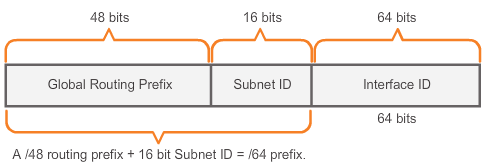Difference between revisions of "IPv6 network addresses"
Jump to navigation
Jump to search
| Line 10: | Line 10: | ||
*'''Global unicast''' - similar to a public IPv4 address, globally unique, Internet routable addresses. It can be configured statically or assigned dynamically. The current range is <span style="color: orange">'''2000::/3'''</span> | *'''Global unicast''' - similar to a public IPv4 address, globally unique, Internet routable addresses. It can be configured statically or assigned dynamically. The current range is <span style="color: orange">'''2000::/3'''</span> | ||
[[File:Ipv6_global_unicast_address.png|none|left|Ipv6_global_unicast_address]] | [[File:Ipv6_global_unicast_address.png|none|left|Ipv6_global_unicast_address]] | ||
*'''Link-local''' - Link-local addresses are used to communicate with other devices on the same local link. With IPv6, the term link refers to a subnet. Link-local addresses are confined to a single link. Their uniqueness must only be confirmed on that link because they are not routable beyond the link. In other words, routers will not forward packets with a link-local source or destination address. They are from <span style="color: orange">'''FE80::/10'''</span> range <span style="color: orange">'''FE80 - FEBF'''</span> and also used by IPv6 routing protocols to exchange messages and as the next-hop address in the IPv6 routing table. When DHCPv6 or SLAAC (Stateless Address Autoconfiguration) is used, the link-local address will automatically be specified as the default gateway address. | *'''Link-local''' - Link-local addresses are used to communicate with other devices on the same local link. With IPv6, the term link refers to a subnet. Link-local addresses are confined to a single link. Their uniqueness must only be confirmed on that link because they are not routable beyond the link therefore all router interfaces can can be configured with the same link-local address for easier the router identification. In other words, routers will not forward packets with a link-local source or destination address. They are from <span style="color: orange">'''FE80::/10'''</span> range <span style="color: orange">'''FE80 - FEBF'''</span> and also used by IPv6 routing protocols to exchange messages and as the next-hop address in the IPv6 routing table. When DHCPv6 or SLAAC (Stateless Address Autoconfiguration) is used, the link-local address will automatically be specified as the default gateway address. | ||
[[File:Ipv6_link-local_address.png|none|left|Ipv6_link-local_address]] | [[File:Ipv6_link-local_address.png|none|left|Ipv6_link-local_address]] | ||
*'''Loopback''' - represented as <span style="color: orange">'''::1/128'''</span> or just <span style="color: orange">'''::1'''</span> in the compressed format | *'''Loopback''' - represented as <span style="color: orange">'''::1/128'''</span> or just <span style="color: orange">'''::1'''</span> in the compressed format | ||
Revision as of 14:42, 16 November 2014
There are three types of IPv6 addresses:
- Unicast - An IPv6 unicast address uniquely identifies an interface on an IPv6-enabled device.
- Multicast - An IPv6 multicast address is used to send a single IPv6 packet to multiple destinations.
- Anycast - An IPv6 anycast address is any IPv6 unicast address that can be assigned to multiple devices. A packet sent to an anycast address is routed to the nearest device having that address.
IPv6 does not have a broadcast address. However, there is an IPv6 all-nodes multicast address that essentially gives the same result.
Unicast IPv6 addresses
- Global unicast - similar to a public IPv4 address, globally unique, Internet routable addresses. It can be configured statically or assigned dynamically. The current range is 2000::/3
- Link-local - Link-local addresses are used to communicate with other devices on the same local link. With IPv6, the term link refers to a subnet. Link-local addresses are confined to a single link. Their uniqueness must only be confirmed on that link because they are not routable beyond the link therefore all router interfaces can can be configured with the same link-local address for easier the router identification. In other words, routers will not forward packets with a link-local source or destination address. They are from FE80::/10 range FE80 - FEBF and also used by IPv6 routing protocols to exchange messages and as the next-hop address in the IPv6 routing table. When DHCPv6 or SLAAC (Stateless Address Autoconfiguration) is used, the link-local address will automatically be specified as the default gateway address.
- Loopback - represented as ::1/128 or just ::1 in the compressed format
- Unspecified address - ::/128 or just :: in the compressed format. It cannot be assigned to an interface and is only be used as a source address. It is used as a source address when the device does not yet have a permanent IPv6 address or when the source of the packet is irrelevant to the destination.
- Unique local - some similarity to RFC 1918 private addresses for IPv4, Unique local addresses are used for local addressing within a site or between a limited number of sites. These addresses should not be routable in the global IPv6. Unique local addresses are in the range of FC00::/7 to FDFF::/7.
- IPv4 embedded - used to help transition from IPv4 to IPv6
Special purpose ranges
- 2001:0DB8::/32 - reserved for documentation purposes
IPv6 unicast address has 3 parts
- Global routing prefix - network portion of the address that is assigned by the provider, such as an ISP, to a customer or site, currently /48 global prefix is used by ISPs
- Subnet ID - used by an organization to identify subnets within its site
- Interface ID - equivalent to the host portion of an IPv4 addres. The term Interface ID is used because a single host may have multiple interfaces, each having one or more IPv6 addresses.
Basic IPv6 router configuration
Router(config-if)#ipv6 address 2001:dc9:bdbc:1::1/64 - configure interface with ipv6 address/prefix
Router(config)#ipv6 unicast-routing - enables ipv6 routing
References
- Internet Protocol Version 6 Address Space IANA.org
- RFC 6724 - Default Address Selection for IPv6 rules


